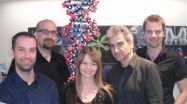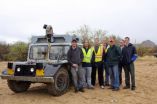(Press-News.org) The use of clot-busting drugs to treat acute ischemic stroke increased from 2005 through 2009 — but is still low, according to research reported in Stroke: Journal of the American Heart Association.
Clot-busting drugs are known as thrombolytics, and tissue plasminogen activator (tPA) is the only FDA-approved thrombolytic for treating acute ischemic stroke, which is caused by a blood clot in the brain.
Although the study didn't follow patients after hospital discharge, "we believe that the increased treatment rate has the potential to reduce the overall burden of stroke disability and morbidity," said Opeolu Adeoye, M.D., lead author of the study and assistant professor of emergency medicine and neurosurgery at the University of Cincinnati in Ohio.
Using Medicare records and pharmacy billing codes, researchers found 1.1 percent to 1.4 percent of acute ischemic stroke patients received a thrombolytic drug in 2005, and 3.4 percent to 3.7 percent did in 2009.
In a further calculation, the researchers assumed that some or all of the billings for unapproved thrombolytics and/or treating hemorrhagic stroke were billing errors, or represented an ischemic stroke that subsequently developed some bleeding, which occasionally occurs. This upped the use of tPA, Adeoye said, which led to a conservative estimate that 3.4 percent to 5.2 percent — or 23,800 to 36,000 of the 700,000 Americans who had an ischemic stroke in 2009 — received tPA.
Treatment with a clot-busting drug is most effective as soon as possible after stroke symptoms begin — ideally within the first hour, according to American Heart Association/American Stroke Association guidelines. But, doctors can give tPA to some patients up to 4.5 hours after symptoms begin.
###
Co-authors are Richard Hornung, Ph.D.; Pooja Khatri, M.D.; and Dawn Kleindorfer, M.D.
Author disclosures and funding are on the manuscript.
Statements and conclusions of study authors published in American Heart Association scientific journals are solely those of the study authors and do not necessarily reflect the association's policy or position. The association makes no representation or guarantee as to their accuracy or reliability. The association receives funding primarily from individuals; foundations and corporations (including pharmaceutical, device manufacturers and other companies) also make donations and fund specific association programs and events. The association has strict policies to prevent these relationships from influencing the science content. Revenues from pharmaceutical and device corporations are available at www.americanheart.org/corporatefunding.
Use of clot busters for stroke increased from 2005 to 2009, but still low
American Heart Association rapid access journal report
2011-06-03
ELSE PRESS RELEASES FROM THIS DATE:
U of T scientist leads international team in quantum physics first
2011-06-03
TORONTO, ON - Quantum mechanics is famous for saying that a tree falling in a forest when there's no one there doesn't make a sound. Quantum mechanics also says that if anyone is listening, it interferes with and changes the tree. And so the famous paradox: how can we know reality if we cannot measure it without distorting it?
An international team of researchers, led by University of Toronto physicist Aephraim Steinberg of the Centre for Quantum Information and Quantum Control, have found a way to do just that by applying a modern measurement technique to the historic ...
Work by UH evolutionary biologist may one day help with chronic diseases
2011-06-03
HOUSTON, June 2, 2011 – Working to better predict general patterns of evolution, a University of Houston (UH) biologist and his team have discovered some surprising things about gene mutations that might one day make it possible to predict the progression of chronic disease.
UH evolutionary biologist Timothy Cooper and his colleagues describe their findings in a paper titled "Negative Epistasis Between Beneficial Mutations in an Evolving Bacterial Population." The report appears June 3 in Science, the world's leading journal of original scientific research, global news ...
Trans-Atlantic team announces Huntington's disease breakthrough
2011-06-03
Medical researchers may have uncovered a novel approach to treat an incurable and ultimately fatal neurodegenerative disease that affects hundreds of thousands of people.
Two international studies, one led by the University of Leicester, and the other a collaboration with Leicester led by scientists in the USA, hold out promise for slowing down the development of Huntington's disease – and potentially, Alzheimer's and Parkinson's diseases. The research, which is in its early stages, represents an important milestone in understanding these debilitating conditions.
Huntington's ...
Rett protein needed for adult neuron function
2011-06-03
HOUSTON (June 2, 2011) – The protein MeCP2 is porridge to the finicky neuron. Like Goldilocks, the neuron or brain cell needs the protein in just the right amount. Girls born with dysfunctional MeCP2 (methyl-CpG-binding protein 2) develop Rett syndrome, a neurological disorder. Too much MeCP2 can cause spasticity or developmental delay with autism-like symptoms in boys.
Now, researchers at Baylor College of Medicine (www.bcm.edu) and Texas Children's Hospital (www.texaschildrens.org) have found that the neuron needs a steady supply of this protein for its entire existence. ...
Robotic mine vehicles successfully reanimated by UA engineering students using industry support
2011-06-03
TUCSON, Ariz. (June 2, 2011) -- In just 10 weeks, a group of University of Arizona engineering students took five crates of surplus hardware and two heavy-duty test vehicles, which didn't run, and mixed them with youthful enthusiasm, tenacity and many long hours to build two robotic vehicles that successfully drove themselves around UA's test mine.
It was no easy task, and predicted by some as too big a project for a one semester course: ENGR 450/550, autonomous vehicle systems. But the naysayers didn't factor in the can-do attitude of 23 undergraduate and graduate students ...
Mega Wins at Sun Vegas Casino
2011-06-03
2 players have struck it lucky at Sun Vegas Internet Casino on Monday the 30th May 2011. JK won CAD 23,373.50 playing on the video slot game Thunderstruck; CAD 21,453.50 on the 5-reel slot, Ladies Nite; and CAD 9,995.00 on the Egyptian-themed game, ISIS. Thus JK walked away with total winnings of CAD 54,822.00. Another winner, NJ, won $16,187.40 on Break Da Bank Again and $5,868.00 on Mega Moolah Summertime Progressive, giving her a total of $22,055.40.
Casino Manager at Sun Vegas Casino, Austin Green, said, "Two winners in one day is what makes Sun Vegas Casino ...
Scientists identify mutations that cause congenital cataracts
2011-06-03
New research identifies genetic mutations that cause an inherited form of cataracts in humans. The study, published online June 2 by Cell Press in the American Journal of Genetics, provides new insight into the understanding of lens transparency and the development of cataracts in humans.
A cataract is a clouding of the crystalline lens in the eye. Opacity of the normally transparent lens obstructs the passage of light into the eye and can lead to blindness. Congenital cataracts (CCs) are a significant cause of vision loss worldwide and underlie about one-third of the ...
For stressed bees, the glass is half empty
2011-06-03
When people are depressed or anxious, they are much more likely to see their glass as half empty than half full. In tough times, evidence of that same pessimistic outlook can be seen in dogs, rats, and birds. Now, researchers reporting online on June 2 in Current Biology, a Cell Press publication, show that bees, too, share those very same hallmarks of negative emotion.
"We have shown that the emotional responses of bees to an aversive event are more similar to those of humans than previously thought," said Geraldine Wright of Newcastle University. "Bees stressed by a ...
Fraser Yachts Review of the First Quarter 2011
2011-06-03
Following a spate of bookings during the last month, things are certainly looking rosier in terms of luxury yacht charter and the news regarding luxury yacht sales is similarly encouraging with an increase in numbers compared to the same period last year. Unfortunately the majority of these sales have been in the 24-35m categories, which represents the smaller end of the market, so while the volume is up the overall value of the market is somewhat down.
Fortunately, however, over the last few days' negotiations have been completed with regard to a number of very large ...
Gladstone scientists discover drug candidate for Alzheimer's, Huntington's disease
2011-06-03
SAN FRANCISCO, CA—June 2, 2011—Scientists at the Gladstone Institutes have identified a drug candidate that diminishes the effects of both Alzheimer's disease and Huntington's disease in animal models, offering new hope for patients who currently lack any medications to halt the progression of these two debilitating illnesses.
Gladstone Investigator Paul Muchowski, PhD, has identified a new compound called JM6 in experiments done in collaboration with an international team of researchers, and which are being published today in an online article in Cell. In laboratory ...
LAST 30 PRESS RELEASES:
Boys are more motivated, while girls are more compassionate?
Study identifies opposing roles for IL6 and IL6R in long-term mortality
AI accurately spots medical disorder from privacy-conscious hand images
Transient Pauli blocking for broadband ultrafast optical switching
Political polarization can spur CO2 emissions, stymie climate action
Researchers develop new strategy for improving inverted perovskite solar cells
Yes! The role of YAP and CTGF as potential therapeutic targets for preventing severe liver disease
Pancreatic cancer may begin hiding from the immune system earlier than we thought
Robotic wing inspired by nature delivers leap in underwater stability
A clinical reveals that aniridia causes a progressive loss of corneal sensitivity
Fossil amber reveals the secret lives of Cretaceous ants
Predicting extreme rainfall through novel spatial modeling
The Lancet: First-ever in-utero stem cell therapy for fetal spina bifida repair is safe, study finds
Nanoplastics can interact with Salmonella to affect food safety, study shows
Eric Moore, M.D., elected to Mayo Clinic Board of Trustees
NYU named “research powerhouse” in new analysis
New polymer materials may offer breakthrough solution for hard-to-remove PFAS in water
Biochar can either curb or boost greenhouse gas emissions depending on soil conditions, new study finds
Nanobiochar emerges as a next generation solution for cleaner water, healthier soils, and resilient ecosystems
Study finds more parents saying ‘No’ to vitamin K, putting babies’ brains at risk
Scientists develop new gut health measure that tracks disease
Rice gene discovery could cut fertiliser use while protecting yields
Jumping ‘DNA parasites’ linked to early stages of tumour formation
Ultra-sensitive CAR T cells provide potential strategy to treat solid tumors
Early Neanderthal-Human interbreeding was strongly sex biased
North American bird declines are widespread and accelerating in agricultural hotspots
Researchers recommend strategies for improved genetic privacy legislation
How birds achieve sweet success
More sensitive cell therapy may be a HIT against solid cancers
Scientists map how aging reshapes cells across the entire mammalian body
[Press-News.org] Use of clot busters for stroke increased from 2005 to 2009, but still lowAmerican Heart Association rapid access journal report



